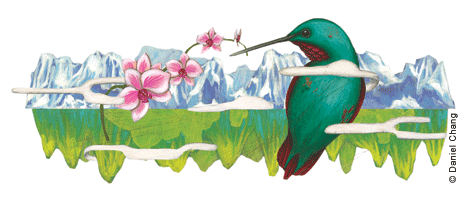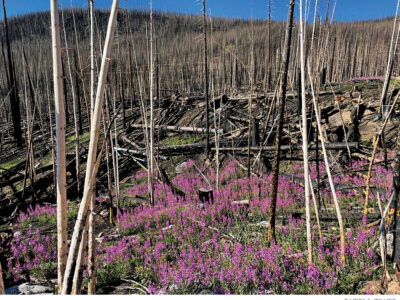
Hiking over the hump of the continent, and something else.
By Steven Schwartzberg | I am hiking to the Continental Divide for the first time, and I am excited.
I first learned about this geographic novelty in 1968, in Mrs. Granich’s fifth-grade class, from mimeographed sheets redolent with the smell of fresh ink. On one side of the Divide, all water flows east—spilling and seeping its gradual way into the Atlantic Ocean. On the other, it flows west, rushing or rolling inexorably toward the Pacific. It’s a spiny fulcrum bisecting the Americas, from Alaska to the nether tip of South America. My starting base is an intentional farming community near the sleepy Costa Rican village of Buenos Aires. From here it’s a two-day climb to the Divide, which in this remote region remains an unspoiled, uncharted cloud- and rainforest.
My hike comes, with coy symmetry, precisely halfway through a two-month stay in Central America. And my time here comes in the middle of what has proven to be a longer journey; I’ve spent much of my 40s on the road, a wanderer, a nomad, a seeker.
Antonio, one of the community members, will guide me along with two other guests, Heinrich and Wilson. An enthusiastic, bilingual host, Antonio informs us the hiking will vary from easy to arduous, through a variety of landscapes and vistas.
We set out early in the morning, enlivened with the mix of excitement and slight nervousness that starts a new adventure. Weaving in and out of patches of steep terrain under an already hot, tropical sun, we settle into our hiking rhythm, alternately chatting and staying silent. Soon the initial novelty becomes routine and my mind drifts. My thoughts wander toward, and then latch onto, a mathematical curiosity: For the first time, I am now more than half the age of my maternal grandmother, my sole surviving grandparent. It has taken me 48 years, six months and a couple of weeks to reach this—this what? Milestone? Marker? Irrelevancy?
My grandmother is 97: proud, blind, defiant, widowed, alert, and still hungry—ravenous, even—for the small joys and surprises of life. Not yet willing to concede that death will one day find even her address. A woman who, as far as I can tell, has prepared less for the end of her life than I have for mine. Whose insistence on living, whose weed-busting-through-concrete tenacity, inspires and worries me. The inspiration is obvious. The worry is that her stubbornness will presage a hard dying—whenever, that is, death can arm himself for the battle. I think he’s been avoiding it, knowing what a bruiser it will be. (I imagine him arriving for work each morning, arranging his day’s duties. He pulls Ida Goldstein’s card and, making sure his boss isn’t looking, slips it back into the deck.)
Antonio points out a poisonous snake sleeping under a log. This snaps me from my musings. We weren’t in danger, he says, but could have been had we woken and startled it. “Unlike my snake,” he adds with a leer. “He never sleeps.”
In his late 20s, Antonio has been a fit, energetic, and macho guide. Though cloaked in a New-Agey veneer, his banter percolates with adolescent bursts of sexual bluster. Much of it hovers in that tricky zone where good-natured male badinage devolves into the kind of bravado and competitive ribbing I dreaded when I was younger. I had forgotten some guys still talk like that.
Then there’s Heinrich and Wilson. Heinrich is a German tourist mad about orchids. Seeing the Great Divide, it turns out, is irrelevant to him; he’s along for the orchid hunting, bearing camera equipment as bulky and sophisticated as a NASA project. Wilson is a pert, eager-to-please, fortysomething Asian man from Canada with a yoga practice as passionate as Heinrich’s orchid mania, and the disquieting energy of a grown man who I suspect never lost his virginity.
After several strenuous hours we reach the tiny, dilapidated hut where we will spend the night. We eat a late lunch and head out, freed from our bulky packs, for an afternoon of looking around and stalking the wild orchid. That night we cook a basic guys-camping-out dinner (beans, corn, canned soup) and turn in early. I am awakened the next morning at 4 a.m. by strange sounds: Wilson has started his loud, lengthy Pranayama practice, and then offers a series of noisy sun salutations on the creaky floor well before the sun is remotely near the Americas. Tired and achy in my sleeping bag, I silently go back and forth between admiring his dedication, envying his discipline, and wanting to strangle him.
With little fanfare we pack up, eat breakfast, and continue our journey. I settle in for another long slog, but sooner than I anticipated, Antonio announces, “We have arrived.”
I look around. We’ve made it, I’ve made it. At last, the Continental Divide! The Great Divide! Here I am, at the destiny line of water, and … wait, this is it? That’s all there is?
I realize I had assumed that a clear-cut geographical demarcation would be apparent. It’s not. I had even, absurdly, envisioned a plaque. But there’s nothing. No signpost, no dividing point, no evidence of any sort. And of course it’s not just one particular spot, but rather the shifting, rolling, ever-changing highest point in a dense thicket of cloudforest.
So much for a spiny fulcrum.
I pee, to mark the occasion and because it’s our first break since breakfast. I note that my flow will begin its long journey home west, to the Pacific.
We begin to bushwhack through the thick growth. Both sides of this ambiguous crest are verdant, and luxuriant, especially the eastern flank. Antonio has indeed led us to untrammeled, untraveled cloudforest, and the setting is mysterious, magical, eerie. Moss covers everything—not just the north sides of the trees, not just the stones that don’t roll.
Wordlessly we separate. Although there is no clarity about the actual divide, there is no shortage of strange, wondrous beauty. This is a forest out of a fairy tale, out of deep imagination, out of some long-buried primeval memory. Dampness soaks everything, alternately obscuring and revealing the surroundings. Swirls of low clouds hover, heave, spill, and evaporate, saturating the land, seeping into me. The mist—now warm, now cool—can be seen, felt, and watched as it forms and evaporates, as evanescent as bubbles of thought to a Buddhist bikkhu.
And so, the thought comes to me, and swirls, and soaks in: When, precisely, did I become middle aged?
Is there a date, a dividing point when youth, or whatever precedes midlife, ended? What month did my libido start to wane? On which day did I stop feeling attractive? If I scan my old weekly calendars, can I pinpoint just when my dreams shrunk? When did a new generation start speaking a communal lexicon of sex and romance different from mine—a language I could possibly learn but, like any adult student of something other than one’s native tongue, one I’ll always speak with the telltale accent of a foreigner?
The ground of this unusual forest is spongy, uncertain, uneven. I make my way through this repository of many years’ entanglements, treading carefully on a carpet of vines, lianas, mosses, tree trunks: matter thick with the detritus of decay and life, death and growth, intertwined, indistinguishable. At times I discover that the ground is in fact only a raised surface of jungle thicket, rising like a theatrical ramp, or a fake stairway in an Escher print. There are no paths to follow, no footprints showing the way. Retracing one’s steps is pointless. Sometimes this unsure ground actually gives way and I fall through, but always—so far—to a soft landing.
And I note: I am softer, too. My belly less taut, my ire less adamant, my fears less urgent, my erections less firm, my shame less lacerating, my opinions less righteous, my goals less driven, my hopes less certain.
These trees, these vines, these lianas and bromeliads and epiphytes, this enveloping opulent green, seems confident of its own power, its own mystery. It is as if we have been graciously allowed to enter here; the jungle, indifferent, need not bend to our will. Eventually all this verdure, all this life, all this moisture will end in the vast ocean awaiting. Pacific, or not.
I stand silently on the spongy, tenuous ground. I look around. My mind tries to penetrate the thicket, to discern or impose some order. Suddenly, a hummingbird—turquoise, with an iridescent, shimmering rainbow prism of a chest—darts and whirs out of nowhere to hover inches from my face. I am startled by its nearness, its sudden presence, its contained frenzy of motion and sound. It whizzes and flutters in front of me, as if trying to make sense of this strange life form. It zooms off, as quickly as it arrived. My breath seizes involuntarily in wonder.
It is over almost before I know it, this unexpected fleeting encounter. Yet for those brief moments, this whole long journey into the mushy, moist morass of disappointment and mystery and confusion and impenetrable beauty is undeniably worth it.
I rejoin the others. We linger a bit longer in the general vicinity of the divide. We then begin our descent back to the farm. The distance back will be the same as the climb, but it will go much faster.
Steven Schwartzberg C’80 can be reached at Steve_Schwartzberg@yahoo.com. His grandmother died earlier this year, three weeks shy of her 101st birthday.




